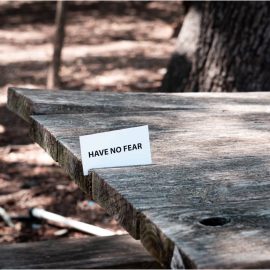

This article is an excerpt from the Shortform summary of "Alcoholics Anonymous: The Big Book" by AAWS. Shortform has the world's best summaries of books you should be reading.
Like this article? Sign up for a free trial here .
What is Step 4 of AA? What do you include in the 4th step inventory?
The 4th step inventory is a list of the things that make you drink. In Step 4 of AA, you’re trying to identify the emotions or your other flaws through soul-searching.
Read more about the process of making the 4th step inventory and what you do with that list.
The 4th Step Inventory
Conduct a moral inventory of yourself. Recognize your flaws and emotions that cause you to fail around alcohol. This will help you find what makes you drink; removing these flaws will free yourself from drinking. Confess these personality defects to another person. A weight will feel lifted from your shoulders.
Step 4 of AA
“We made a searching and fearless moral inventory of ourselves.”
This is soul-searching. As if you owned a retail store, do an inventory of yourself. Find the damaged and unsellable goods—search for your flaws that cause your failure when drinking. The 4th step inventory includes the flaws that drive you to drink—your anger, guilt, resentment, and other emotions.
Freeing yourself of these flaws means freeing yourself of the need to drink. If you become sorry for what you’ve done, and you have an honest desire to become better, you’ll be forgiven and avoid the guilt that drives people to drink.
Resentment is an especially common and powerful flaw. The 4th step inventory helps you avoid resentment. Make a list of what and who makes you angry. Then ask yourself why you’re angry, and how this anger causes you injury. For example:
- I’m resentful at: my boss.
- Because: He’s unreasonable and overbearing. He threatens to fire me for missing work.
- This harms my: Self-esteem and feeling of security.
When doing the 4th step inventory of yourself, you must avoid blaming other people’s flaws. Focus just on yourself—where had you been selfish, inconsiderate, dishonest, or self-seeking? Make a list of your wrongs only.
If you can’t help blaming other people, consider that the people who have wronged you are themselves spiritually sick. Had they been perfectly fine and of right mind, they wouldn’t have behaved in a way that angered you. So treat those other people with the same compassion you would treat a physically sick person—by being tolerant, patient, and helpful.
Confessing What Was in Your 4th Step Inventory
“We admitted to God, to ourselves, and to another human being the exact nature of our wrongs.”
The goal is to confess every single dark corner of your past, every twist of character, to another person. This is a big shift from keeping your secrets—you admit your shortcomings out loud to another human being. This step relieves you of the burdens of your past, as though a great weight were lifted.
Why is another person important? In the authors’ experience, an individual, solitary confession is insufficient. It doesn’t push you to examine all your dark corners, and you leave your worst items in your inventory.
You should find a person who can keep your secret and is willing to help you. This often means a doctor, a discreet friend, or a member of your trusted community. Don’t choose someone you’ll hurt with this confession, such as your spouse or parent.
Explain to the person you’re confessing to what you’re about to do and why you have to do it. Help them understand that this is a matter of life and death. Most people are glad to help.
Go through all your confessions. After you finish, it should feel as though a huge weight has been lifted. You’ll look at the world afresh, with relief. You’ll feel your drinking problem has disappeared. You’ll be at peace.
At times, you may find it necessary to revisit Step 4, do more moral inventory, and then confess a second time.

———End of Preview———
Like what you just read? Read the rest of the world's best summary of AAWS's "Alcoholics Anonymous: The Big Book" at Shortform .
Here's what you'll find in our full Alcoholics Anonymous: The Big Book summary :
- How alcoholism is a nearly insurmountable disease that non-alcoholics can't understand
- The key 12 steps of the program, and why they work
- Why Alcoholics Anonymous isn't a cult and why it works






